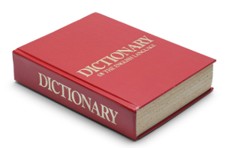
Think about the following questions.
1. Which languages have influenced the development of your native language?
2. Do you know any languages that have influenced the development of English?
3. Do you think people should try hard to use "correct" language at all times?
VOCABULARY PREVIEW
Match each New Academic Word List(NAWL) word with the correct definition.
- standardize _____
- vowel _____
- profound _____
- pronounce _____
- consensus _____
- linguistic _____
- a. to establish consistency according to set rules
- b. general agreement
- c. characterized by intensity of quality or importance
- d. of or relating to language
- e. to utter the sound of a word or part of a word
- f. an open-mouthed, resting-tongued sound in a language
EVER-EVOLVING ENGLISH

Like all languages, English has undergone many fundamental changes over time. The first form of English, now referred to as Old English (OE) or Anglo-Saxon, was first spoken in England and parts of Scotland. It was spoken between the middle of the fifth and twelfth centuries and was characterized by a comparatively limited vocabulary, as well as numerous endings that marked the gender, number, and case1 of words.
When the Normans invaded the British Isles in 1066, English came under the influence of the French-speaking conquerors2, who became the new aristocracy3. The class differences of this period are still reflected in the language. The words "beef," "pork,” and "poultry," for instance, all come from French, yet the words "cow," "pig," and "chicken” all have OE origins. This reveals who was taking care of these expensive animals and who was eating them: as one popular saying puts it, “French for the table, English for the stable." Besides adding many French words, the language also gradually lost many of its OE endings. This new form of English, referred to as Middle English (ME), developed from 1066 to around 1500.
Meanwhile, between 1200 and 1600, a major alteration occurred in the way people pronounced many vowel sounds, particularly the long vowels. The completion of this change, dubbed4 "the Great Vowel Shift," marks the birth of the modern English language. Modern English developed rapidly during the reign of Elizabeth I (1558-1603), which was also the period when the great playwright William Shakespeare lived and wrote. His work had a profound influence on the language, introducing many new words and phrases that we now take for granted—like “uncomfortable,” which comes from Romeo and Juliet.
Modern English was characterized by more active attempts at standardization of English usage5 and spelling. During the 1600s and 1700s, many writers called for English to follow more regular patterns, as French and Latin did. They also proposed that an English academy be created. No such academy was ever established, but numerous grammar texts and dictionaries started appearing.
The first official book of grammar rules was written by William Loughton in 1734, and in 1761, Joseph Priestley wrote and published The Rudiments6 of English Grammar. These texts were based on what the writers considered "correct" grammar rather than on an analysis of how people actually spoke and wrote; thus, their approach is referred to as prescriptive7 grammar. In later years, linguists8 argued that grammar should describe how people really use language and not how writers think it should be used, adopting an approach called descriptive grammar.
Today, English is spoken by so many people in so many different countries across the globe that it has become even harder to standardize. The contemporary consensus lies somewhere between the prescriptive and descriptive approaches. Educators generally try to follow something called Standard English (SE) so as to avoid a complete lack of order in the use of English. However, as one can see in the differences in spelling and vocabulary between, say, British and American English, rules can be difficult to enforce. Think of examples such as the American spelling of words like "analyze" or "color," which are spelled "analyse” and “colour" in the UK. Both forms are seen as correct, as long as they are used in the right country.
To help ensure that SE stays up to date, respected dictionaries publish annual lists of new words that have been accepted into the lexicon9. These may be words that started out as slang, and many are new technological terms: in 2021, the Merriam- Webster online dictionary added "reaction GIF” and “coworking.”
There have also been some significant changes in grammar over the years. For decades, prescriptivists argued that English sentences should never end in prepositions and that splitting infinitives was incorrect. (An example of a split infinitive is "to really want" instead of "really to want.") These days such rules are generally considered invalid because they come from Latin, which is no longer viewed as a model for English. Correct English grammar is now considered largely a question of functionality, style, and taste, and the context in which language functions is taken into account before passing judgment.
As long as people are able to communicate effectively and have a basic standard to guide them, English serves its linguistic purpose. After all, the only languages not in flux10 are those that are no longer in use.
New Academic Word List
- case 1 : n. a form of a noun, pronoun, or adjective indicating its grammatical function in a sentence
- conqueror 2 : n. one who gains territory by force
- aristocracy 3 : n. a governing body or upper class usually made up of a hereditary nobility
- dub 4 : v. to name or call
- usage5 : n. the way in which words and phrases are used in a language community
- rudiments6 : n. first principles; basics
- prescriptive 7 : adj. giving exact rules or instructions about how something should be done
- linguist 8 : n. a person who studies language in a scientific way
- lexicon 9 : n. the vocabulary of a particular language
- flux10 : n. a state of flow and change
READING COMPREHENSION
A ‣ Mark each statement as true (T) or false (F) according to the reading.
- The development of Middle English (ME) began when the Normans conquered England.
- True
- False
- "The Great Vowel Shift" was very significant in the development of Modern English.
- True
- False
- During the 17th century, an academy for English was established.
- True
- False
- Priestley was one of three authors of The Rudiments of English Grammar.
- True
- False
- Educators today use a purely descriptive approach to grammar.
- True
- False
B ‣ Choose the best answer according to the reading.
- What is the reading mainly about?
- a. Shakespeare's influence on the development of English
- b. The way class differences control how we use language today
- c. The history and development of the English language
- d. The relationship between British history and English development
- Which of the following best describes prescriptive grammar?
- a. Grammar that is based on what the writers consider to be correct
- b. Grammar that describes how people really use language
- c. Grammar that is considered largely a question of style and personal taste
- d. Grammar that has been borrowed from another language
- What is the main idea of paragraph 6?
- a. There is no longer any single "correct" form of English.
- b. Different acceptable spellings prove spelling is no longer important.
- c. The expansion of British colonies made standardization more important.
- d. Because there are different forms, there is no such thing as improper English.
- Which is an example of a grammar rule that has recently been relaxed?
- a. Don't end a sentence with a subject.
- b. Don't split infinitives.
- c. Don't begin a sentence with a preposition.
- d. Don't leave out the verb.
C ‣ Look for the answers in the reading and write them on the lines.
- Why does English use different words for an animal and its meat (e.g., "cow" and "beef")?
_____ - How did Shakespeare influence the English language?
_____
SUMMARY
Fill in the blanks with the phrases in the box.
- at standardization
- Norman invasion
- limited vocabulary
- French influence
- the Great Vowel Shift
- relaxed grammar rules
|
Origins (OE)
|
| ↓ |
|
Normans (ME)
|
| ↓ |
|
Modern English
|
| ↓ |
|
Contemporary English
|
VOCABULARY PRACTICE
Fill in the blanks with the words in the box. Change the form if necessary.
- consensus
- linguistic
- profound
- pronounce
- standardize
- vowel
- The Norman invasion had a(n) _____ impact on English culture.
- Learning to speak English can be difficult because the spelling of a word does not always show you how to _____ it.
- The names of some Welsh towns look unusual because they have no _____ , such as Bwlch in southern Wales.
- Many tribal languages are almost impossible to _____ because they have no writing systems.
- The _____ of film critics seems to be that the movie is well worth seeing.
- The various countries of the Americas have historical, cultural, and _____ connections to Europe.
SUPPLEMENTAL READING
The First English Dictionary

In 1582, the Italians established the Accademia della Crusca to "purify" the Italian language and to create a dictionary, which was finally published in 1612. In France in 1635, Cardinal Richelieu called upon his country to establish the Académie Française to establish "definite rules" for the French language. Both academies existed to regulate and improve the language used in each country.
Around the same time, in 1662, the Royal Society in England, under Charles II, established a committee to work toward the standardization of the English language. The committee's main goals were to publish a grammar of English, to create a dictionary, and to consider ways to standardize spelling.
However, the first English dictionary was not published until 1775. It was compiled and written by Samuel Johnson. Johnson's Dictionary of the English Language was different from the "word lists" published before it in two respects. First, Johnson's dictionary included more words. His dictionary contained 100,000 words, whereas the longest previous word list had contained only 40,000. Second, his lexicon focused on word usage based on examples taken from the works of famous English writers.
It took Johnson nine years to complete the dictionary, working mostly on his own for the entire project. After its publication, Johnson's work became the standard dictionary for the English language for the next 150 years. The Oxford English Dictionary was first published in the early 1900s, and it was not until then that Johnson's dictionary was finally outsold.
Fill in the blanks with information from the reading.
- English standardization was preceded by the founding of language academies in Italy and _____ .
- For his dictionary, Samuel Johnson studied how words were used by _____ .
- Johnson's dictionary was finally outsold by the _____ .

Leave a comment
Load more